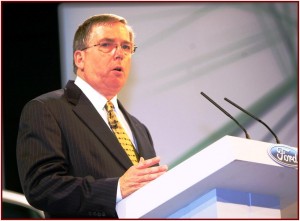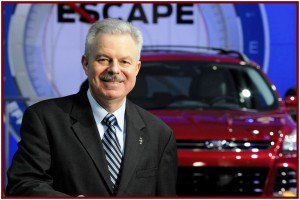
“During my 34 years at Ford, I’ve had the opportunity to lead the company’s operations on three continents as well as head up our talented Finance team,” Booth said.
Ford Motor Company announced today that Lewis Booth, 63, executive vice president and chief financial officer, and Derrick Kuzak, 60, group vice president, Global Product Development, will retire on 1 April. Both of these key executives served the Number Two U.S. automaker for more than 30 years. Booth had wanted to retire for years but stayed on out of loyalty. Kuzak came as a surprise.
These senior executive changes are unfortunate in timing as both the highly compensated Booth and Kuzak did yeoman’s work in trying to right a still troubled company that recently is showing signs of returning to competitive health.
In late 2008, a week after the collapse of Lehman Brothers triggered a worldwide financial crisis and the ongoing Great Recession, Booth returned from heading Ford of Europe to Dearborn as Ford’s chief financial officer where management was struggling with the dire cumulative effects of years of losses, declining sales, heavy debt loads and unfunded pension liabilities – the same issues Booth was grappling with in Europe. Prior to that Booth headed Mazda in Hiroshima. Ironically, it was Booth as Ford’s CFO who was forced to sell Ford’s controlling interest in the feisty Japanese company for badly needed cash.

“The most rewarding accomplishment is to see all of our teams working together around the world to deliver vehicles in each region that are now consistently great to look at, great to sit in and fun to drive,” Kuzak said.
Kuzak led the creation of the so called One Ford global product cycle plan, after previous product development executives failed to reduce complexity and duplicated but separate platforms, as well as improve vehicle quality and increase engineering efficiency – all problems that were clearly identified in the 1990s under the failed Ford 2000 plan, which was the first of many recent attempts to fix engineering.
Kuzak’s chances of succeeding – where previous product development execs failed because of internal corporate politics and turf protecting – improved considerably since Alan Mulally had just replaced an ineffective Bill Ford as CEO. Ford had lost $30 billion in the previous three years, when Kuzak was given the global assignment in December of 2006. Mulally, it’s said by insiders, put a stop to the internal bickering, out of financial necessity. What happens when Mulally, 66, eventually retires remains to be seen, since Ford has a terrible record pulling off orderly transitions as family members vie with proven inside and outside talent for key roles.
Kuzak’s consolidation work is still very much in process; and it cost Ford its Mercury brand, even while Lincoln due to a lack of investment and vision remains a non-existent regional presence in the luxury car segment. Ironically, Kuzak was the lead engineer on the top selling Ranger compact pickup truck, a segment that Ford has now inexplicably abandoned to Toyota and Chevrolet, and he was the key Ford engineering executive who brought home the wildly successful Ford Escape program, which was based on a Mazda platform. The latest strategy to build small cars and trucks off of expensive Ford of Europe platforms is high risk, potentially high cost, which in previous iterations failed. The best selling Ford car remains by far the aging Fusion, built off a Mazda6 design. With the Mazda engineering option now gone, the new Fusion due later this year comes off a Ford Europe design.
Previous Mondeo-based Ford offerings, the Contour and Mercury Mystique, were not successful due to a combination of high price, poor quality and limited interior room. This time around Ford claims things will be different. The new Fusion will deliver best-in-class fuel economy with its upcoming gasoline, hybrid and plug-in hybrid versions, Ford boasts.
Ford’s relative lack of success in car segments will make this launch one to watch. The Number 2 automaker in U.S. sales should have picked up more than a 3.7% increase in passenger car sales during 2011 while the industry gained 9% in the view of critics. And this small gain came with all the major Japanese automakers virtually out of the market for months – May to September or later and still not completely recovered.
Booth will be succeeded by Bob Shanks, who is currently vice president and Controller. Kuzak will be succeeded by Raj Nair, who is currently vice president, Engineering, Global Product Development. Neither has nowhere near the depth of experience of their predecessors.
The Mulally succession issue – indeed the entire Ford succession plan- now once again looms large on the Dearborn horizon. Mark Fields, the current head of the Americas and previously the Premier Automotive Group and Mazda, seems to be a potential heir, but the Ford family remains the wild card.And Field’s past record where he almost left the company remains an issue.

